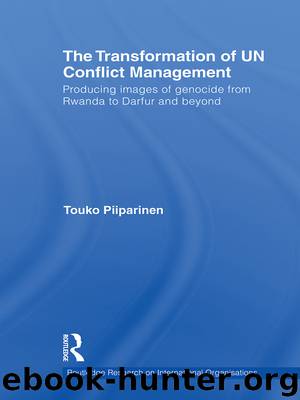The Transformation of UN Conflict Management by Piiparinen Touko

Author:Piiparinen, Touko.
Language: eng
Format: epub
Tags: Biogeography
Publisher: Taylor & Francis (CAM)
Two major conclusions can be drawn from this statement. First, it falsifies the hypothesis advanced in Chapter 3 of this book, which suggested that the positive experiences of the UN in resolving civil wars in the early 1990s, for example in Namibia and El Salvador, generated cognitive dissonance with regard to the Rwandan case by producing over-optimism concerning the Arusha peace process. As the above statement illustrates, the early 1990s were distinguished not only by successes but also by major setbacks such as the Angola case, where the peace agreement signed on 31 May 1991 was torn to pieces only eighteen months later by the eruption of fighting between UNITA rebels and government forces. However, the hypothesis outlined in this section concerning post-decisional rationalisation is supported by the above statement. On the one hand, it reflects the way in which the UN peacekeeping doctrine required uncompromising impartiality on the part of Secretariat officials in implementing a peace agreement at the time of the Rwandan conflict.53 On the other hand, it illuminates the fact that UN officials continue to believe that they were subject to overwhelming constraints which impelled them to act as they did. They still maintain the view that averring trust in the good faith of the parties that signed the Arusha agreement constituted the ‘only way’ to proceed. However, it must be noted that such rationalisation of decision a posteriori is common to all people and to all decision-making (human stratum), not solely to the UN bureaucracy (social stratum).
In addition to post-decisional rationalisation, cognitive dissonance is typically facilitated by aggravating factors. Dissonance theory assumes that the higher the costs and risks to which a person or bureaucracy is subject as a result of discrepant information, the greater the dissonance becomes (Jervis 1976: 387). In the Rwandan case, this equation refers to interaction between two mechanisms, namely organisational learning and bureaucratic rationalisation: from the viewpoint of instrumental rationality, the risks of responding to early warning signals (pre-genocide phase) and portraying the conflict as ‘manageable’ (genocide phase) were simply too high for the organisation, which further intensified the Secretariat’s reluctance to accept new information. Conforming to the new, discrepant information, such as the January cable and other early warning signals, would have risked both UNAMIR’s mandate and the impartiality of the UN in the Arusha peace process. It would also have jeopardised the series of painstaking efforts achieved by the international community since June 1992, which had culminated in the signing of the peace accord on 4 August 1993.
Third, the Secretariat’s conduct was characterised by dissonance reduction, which refers to the avoidance of new information likely to augment dissonance. As cognitive dissonance is psychologically distressing and generative of internal conflict, a person or bureaucracy will strive to reduce it by disparaging discrepant information (Jervis 1976: 382). The following discourse between the New Zealand delegation and the Secretariat in the Security Council’s informal meeting on 12 April 1994 is especially illustrative of dissonance reduction: at the outset of that meeting, the
Download
This site does not store any files on its server. We only index and link to content provided by other sites. Please contact the content providers to delete copyright contents if any and email us, we'll remove relevant links or contents immediately.
The Pirates of Somalia by Jay Bahadur(1627)
Political Theology by Carl Schmitt(1577)
The Holocaust: A New History by Laurence Rees(1521)
The Social Animal by David Brooks(1452)
A Practical Guide to International Arbitration in London by Hilary Heilbron(1434)
Restitution by Restitution(1424)
Pirates of Somalia by Jay Bahadur(1382)
Coercing Virtue by Robert H. Bork(1357)
The Nuremberg Interviews by Leon Goldensohn(1304)
Basic International Corporate Taxation by Sebastiano Garufi(1214)
A History Of Thailand by Baker Chris(1190)
International Trade and Business: Law, Policy and Ethics by Gabriël Moens & Peter Gillies(1149)
The Global Commons by Susan J. Buck(1137)
The Sovereignty of Human Rights by Macklem Patrick(1113)
Blood Profits by Vanessa Neumann(1113)
Asian Waters by Humphrey Hawksley(1113)
Spring Fever: The Illusion of Islamic Democracy by McCarthy Andrew C(1103)
The Nuremberg Trials: The Nazis and their Crimes Against Humanity by Roland Paul(1053)
Crimes Against Humanity: Historical Evolution and Contemporary Application by M. Cherif Bassiouni(1028)
